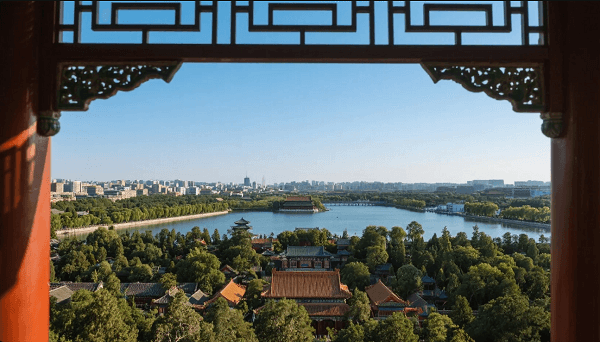選擇 前往中國的最佳時機 是規劃難忘旅程的關鍵部分。作為一個幅員廣大、風景和氣候多樣的國家,理想的旅遊時間會因您的目的地和興趣而有很大的不同。這份全面的指南將協助您掌握季節與假期,確保您能充分發揮您的冒險之旅。無論您的夢想是遠足萬里長城、探索繁華都會、或是乘船遊覽長江,瞭解中國的季節差異對於獲得真正有益的體驗至關重要。
理想的季節:春天和秋天

對於大多數旅行者來說,一致認為春季(四月至五月)和秋季(九月至十月)是 前往中國的最佳時機.這些季節提供全國大部分地區最舒適的天氣狀況。
春季(四月至五月): 春季天氣溫和舒適,非常適合戶外活動。包括北京和西安在內的北方地區陽光明媚,百花齊放。這個時節是參觀故宮、兵馬俑等地標性景點的絕佳時候,不會像夏天一樣酷熱難耐。在南方,景色綠意盎然,鮮豔的花朵鋪滿鄉間。由於漓江水量充沛,空氣清澈,這段時間也是探索桂林和陽朔如詩如畫的喀斯特地貌的絕佳時機。
秋季(九月至十月): 秋季可以說是最受歡迎的旅遊季節,這也是有原因的。天氣清爽乾燥,令人精神為之一振。秋天的紅葉色彩鮮豔,使景觀煥然一新,尤其是在黃山(黃山)和北部省份。晴朗的天空非常適合觀光和攝影。此外,秋天的氣溫非常舒適,長途散步和城市探險都非常愉快。不過,十月初的黃金週假期會帶來大量的國內遊客,因此如果您想避開人潮,最好將行程安排在這段期間。
瞭解夏季和冬季旅遊
雖然春秋兩季是強烈推薦的旅行季節,但在夏季和冬季旅行也有其獨特的優勢和挑戰。
夏季(六月至八月): 中國的夏季炎熱潮濕,尤其是南部和中部地區。上海和重慶等大城市尤其闷熱。然而,這個季節非常適合探索中國較涼爽的山區。西藏、青海和內蒙古等地的高海拔風景令人心曠神怡。夏季也是前往沿海地區享受海灘假期的好時機。另一方面,夏季恰逢學校放假,導致人潮增加,航班和住宿價格也較高。
冬季(十一月至三月): 在中國,冬季旅遊往往被忽視,但卻可以是一種回報豐厚的體驗。雖然中國的北部和中部地區寒冷,部分地區還會降雪,但這也帶來了獨特的機會。舉世聞名的哈爾濱冰雪節是任何勇於面對寒冷的人的必遊之地。此外,航班和酒店的價格普遍較低,熱門旅遊景點也顯得不那麼擁擠。海南島等南部地區提供了一個溫暖的冬季避難所,熱帶氣候非常適合放鬆身心。九寨溝等地的雪山和冰湖景色也美得令人難以置信。

瀏覽中國節日和節慶
了解中國的公眾假期和重大節日對旅行規劃至關重要。這些時段會大大影響您的旅行體驗,因為它們通常會導致大量國內遊客湧入和價格大幅上漲。
農曆新年(中國新年): 每年一月底或二月初,這是中國最重要的節日。在提供奇妙的文化體驗的同時,它也導致了世界上最大規模的人口遷移。交通網絡會變得非常繁忙,許多企業可能會關門歇業。一般建議避免在此期間旅行,除非您要探訪朋友或家人,並對人潮和關閉有所準備。
黃金週: 黃金週假期有兩個:一個是勞動節(五月初),另一個是國慶節(十月初)。十月黃金週的意義尤其重大,因為有數百萬人在國內旅遊。著名的旅遊景點可能會非常擁擠,而且尋找住宿或交通也可能會很有挑戰性。如果您的旅行日期恰逢這些節日,一定要提前預定好一切,並為熙熙攘攘的氣氛做好準備。
其他節慶: 端午節(六月)和中秋節(九月)等節日也很重要,但與主要節日相比,它們對旅遊業的影響較小。不過,這些節日仍是見證活力四射的文化傳統和品嚐時令美食的絕佳機會。
根據您的興趣定制您的旅行
的 前往中國的最佳時機 最終取決於您的具體興趣。
- 適用於大自然和遠足: 春季和秋季是探索黃山、張家界和虎跳峡等景點的理想時機。
- 用於城市探索: 北京、上海和西安等主要城市全年皆可遊覽,但春季和秋季的天氣最適合散步和觀光。
- 適用於冬季運動和風景: 十二月至二月是到張家口(2022 年冬季奧運會的協辦城市)等地滑雪或到哈爾濱欣賞冰雪雕塑的最佳時機。
- 用於熱帶放鬆: 海南島一年四季都是旅遊勝地,但當國內其他地區寒冷的冬天來臨時,海南島就顯得格外吸引人。
選擇合適的旅遊時間,可以讓美好的旅程變得驚艷。考慮到氣候、人潮和假日,您可以規劃出完全符合您喜好的行程。無論您追求的是冬天的寧靜,還是秋天的繽紛色彩,中國的每個季節都有令人讚嘆的景色。
常見問題
問:在雨季前往中國是否安全?
答: 是的,一般來說是安全的。中國的雨季因地區而異,但通常發生在夏季。雖然您可能會遇到較多的降雨,但旅遊基礎設施仍能正常運作。帶備防水裝備和雨傘是明智之舉。
問:我應該提前多久預訂前往中國的行程?
答:最好至少提前 3-6 個月預訂航班和主要住宿,尤其是如果您計劃在春季、秋季或公眾假期等旺季旅行。對於熱門目的地,更早的預訂可以確保更優惠的價格和空房。
問: 是否有任何特定的健康預防措施?
答:在前往中國之前,建議您向醫生諮詢必要的疫苗接種事宜。此外,攜帶基本急救箱也是明智之舉。旅行期間,請飲用瓶裝水,並注意食物衛生,尤其是街頭小販的食物。
問:什麼季節最適合攝影?
答:秋天因天空晴朗、樹葉變化色彩鮮豔,被廣泛認為是最適合攝影的季節。春天也很美,有新綠和盛開的花朵。




